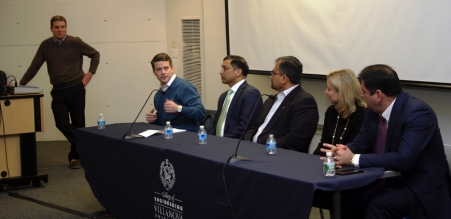College Hosts Second Annual Alternative Careers Panel

Assistant Dean of External Relations Keith Argue hosted the Alternative Career Panel with Scott Nepereny ’00 EE, senior manager, Life Sciences, Accenture; Raj Patil, CEO, AEEC; Abhay Borwankar ’92 MSME, director, Deloitte Consulting; Melissa Morea ’94 CE, director, Global Construction Practice, Navigant Consulting; and Farshid Asl ’98 MSME, managing director of a leading global investment firm.
By Keith Argue
In February, the College of Engineering hosted its second annual Alternative Career Paths Alumni Panel on the topic of “Engineers in the Consulting Sector.” As part of an initiative to enhance the professional development of undergraduates, these panels are intended to increase awareness of career paths that are not traditionally associated with engineering. And like the inaugural panel, “Engineers in the Financial Sector,” the consulting panel attracted a large number of enthusiastic students from across the College eager to learn more about this dynamic profession.
The College was honored to welcome back Farshid Asl ’98 MSME, managing director of a leading global investment firm; Abhay Borwankar ’92 MSME, director, Deloitte Consulting; Melissa Morea ’94 CE, director, Global Construction Practice, Navigant Consulting; Scott Nepereny ’00 EE, senior manager, Life Sciences, Accenture; and AEEC CEO Raj Patil who holds a graduate degree in chemical engineering and is the parent of a current Villanova mechanical engineering student. The panelists provided an insider’s perspective on the diverse fields of business, engineering, financial and management consulting and explained how their engineering education gave them an edge in this demanding profession. There was broad consensus that engineering’s intrinsic “problem-solving” orientation was ideal for the consulting profession. Moreover, given that consulting is inherently client-focused, where strong communication skills are essential, Villanova engineers stand apart because of the curriculum’s liberal arts core. As Morea noted, “Smart people who know how to communicate—that’s what we [Navigant] find at Villanova Engineering.”
The panelists encouraged students interested in consulting to complement their engineering education with business-related courses, which are available through the Engineering Entrepreneurship minor, as well as Villanova School of Business’s Summer Business Institute. When asked why they chose a career in consulting, Borwankar referred to the diversity of assignments. “Every day presents new challenges and opportunities, which is incredibly exciting.” Nepereny values the level of personal autonomy, “There are fewer boundaries and the opportunities to assume greater levels of responsibility and advance your career are truly rewarding.”
After the panel discussion, students had the opportunity to meet one-on-one with these accomplished executives to share their resumes, ask questions and expand their networks. These informal opportunities for networking and engagement are a defining feature of the College’s professional development programs and often have a profound impact upon the students as well as the alumni.
